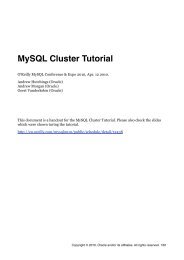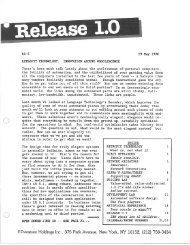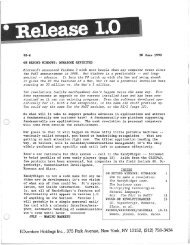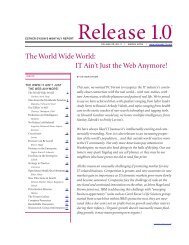Learning Python, 5th Edition - cdn.oreilly.com
Learning Python, 5th Edition - cdn.oreilly.com
Learning Python, 5th Edition - cdn.oreilly.com
You also want an ePaper? Increase the reach of your titles
YUMPU automatically turns print PDFs into web optimized ePapers that Google loves.
just enough information to run the examples and exercises in the rest of the book. You<br />
won’t really start programming per se until Chapter 4, but make sure you have a handle<br />
on the startup details before moving on.<br />
Test Your Knowledge: Quiz<br />
In this edition of the book, we will be closing each chapter with a quick open-book<br />
quiz about the material presented herein to help you review the key concepts. The<br />
answers for these quizzes appear immediately after the questions, and you are encouraged<br />
to read the answers once you’ve taken a crack at the questions yourself, as they<br />
sometimes give useful context.<br />
In addition to these end-of-chapter quizzes, you’ll find lab exercises at the end of each<br />
part of the book, designed to help you start coding <strong>Python</strong> on your own. For now,<br />
here’s your first quiz. Good luck, and be sure to refer back to this chapter’s material as<br />
needed.<br />
1. What are the six main reasons that people choose to use <strong>Python</strong>?<br />
2. Name four notable <strong>com</strong>panies or organizations using <strong>Python</strong> today.<br />
3. Why might you not want to use <strong>Python</strong> in an application?<br />
4. What can you do with <strong>Python</strong>?<br />
5. What’s the significance of the <strong>Python</strong> import this statement?<br />
6. Why does “spam” show up in so many <strong>Python</strong> examples in books and on the Web?<br />
7. What is your favorite color?<br />
Test Your Knowledge: Answers<br />
How did you do? Here are the answers I came up with, though there may be multiple<br />
solutions to some quiz questions. Again, even if you’re sure of your answer, I encourage<br />
you to look at mine for additional context. See the chapter’s text for more details if any<br />
of these responses don’t make sense to you.<br />
1. Software quality, developer productivity, program portability, support libraries,<br />
<strong>com</strong>ponent integration, and simple enjoyment. Of these, the quality and productivity<br />
themes seem to be the main reasons that people choose to use <strong>Python</strong>.<br />
2. Google, Industrial Light & Magic, CCP Games, Jet Propulsion Labs, Maya, ESRI,<br />
and many more. Almost every organization doing software development uses<br />
<strong>Python</strong> in some fashion, whether for long-term strategic product development or<br />
for short-term tactical tasks such as testing and system administration.<br />
3. <strong>Python</strong>’s main downside is performance: it won’t run as quickly as fully <strong>com</strong>piled<br />
languages like C and C++. On the other hand, it’s quick enough for most applications,<br />
and typical <strong>Python</strong> code runs at close to C speed anyhow because it invokes<br />
Test Your Knowledge: Answers | 23
















